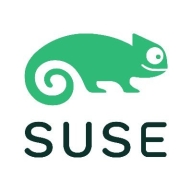

SUSE Linux Enterprise and Debian compete in the enterprise Linux market. SUSE Linux Enterprise holds the advantage in enterprise-grade stability and support, making it favorable for businesses requiring dependable vendor assistance, while Debian's strength lies in community-driven versatility and adaptability.
Features: SUSE Linux Enterprise provides features like an inbuilt HANA firewall, seamless integration with SAP HANA, and advanced security and performance measures. Its automated deployment through tools like AutoYaST and reliable kernel lifecycle management are integral. Debian shines with its vast software library, strong community support, and stable performance, boasting features like compatibility across various environments and advanced package management with APT-get.
Room for Improvement: SUSE Linux Enterprise requires a registered system for support, which could complicate isolated deployments. The command-line expertise may still be necessary for advanced setups, and the resource-heavy management tools can burden smaller systems. Debian could benefit from streamlined support channels, improved corporate integration features, and more polished deployment processes to better serve enterprise environments.
Ease of Deployment and Customer Service: SUSE Linux Enterprise offers a straightforward deployment experience with robust support services, catering to enterprises seeking a solution that ensures smooth operations. Debian's flexible deployment model allows vast customization, although it demands more initial setup effort due to community-based support and system configuration flexibility, serving technically skilled teams well.
Pricing and ROI: SUSE Linux Enterprise incurs higher initial costs due to its premium support and services, aiming for ROI through reduced overhead and reliability. Debian, being open-source, offers lower setup costs and excellent long-term value for businesses managing their support and systems, achieving high ROI by leveraging its cost-effective, adaptable nature.
There were direct cost savings since Debian has no licensing fees, and we did not require paid support, so it saved us considerable money.
We were able to save a substantial amount by using Linux instead of Windows and spending a lot of money on Windows licenses.
I have seen a return on investment; specifically, the cost is around zero because there is no need for a license, and since my whole team uses Debian, we are fine with the number of employees needed.
I have seen a return on investment by switching our clusters from on-prem to Azure public cloud, using our same Bring Your Own Licenses, which saved costs on licensing.
We rely on community resources for support, such as documentation, forums, and asking questions online.
Whenever I had a query, I used Google to search for it and found very helpful information from public platforms.
While it does not have traditional paid customer support like some commercial distributions, the Debian community and documentation are very strong.
SUSE Linux Enterprise provides a stable, secure, and well-supported platform for enterprise workloads, with powerful management tools and robust support for clustering, cloud, and containers.
The customer support is good; whenever we have opened a case, they have provided detailed explanations of the issues and resolutions.
I rate the customer service 10 out of 10 because SUSE has 24/7 availability support, extended support, security, multi-Linux distribution support, upgradation, and everything is user-friendly.
We don't spin up new Debian instances arbitrarily.
As the growth of our infrastructure is required, we can host many Debian servers.
We decided to use Debian because we needed a more stable and predictable base, especially for long-running systems where frequent changes or upgrades could cause issues.
Its scalability is quite good since we are using Azure, which allows us to easily scale up or down our resources as needed.
SUSE Linux Enterprise is widely recognized for its strong scalability, making it suitable for organizations of all sizes, from small businesses to global enterprises.
I rate Debian an eight out of ten because it excels in stability, reliability, and package management, which are very important for long-running production systems.
That long-term support has helped me and my customers by being stable and running well.
In my experience, Debian is very stable.
When HANA is utilized by many applications, I notice that while utilization does increase, we have never faced lagging or server unresponsiveness.
I would rate stability for SUSE Linux Enterprise an eight out of ten.
I believe security on Debian is top-notch due to its long history and the many individuals and organizations that rely on it, meaning there are many eyes on it.
If Debian had a memory-based distribution, similar to Alpine, that would be great, as we could get benefits in terms of memory or embedded systems.
Debian was easy to set up.
Security is a top concern, and further strengthening default security policies, simplifying compliance management, and integrating advanced vulnerability management tools would be a valuable improvement.
The software manager was different, making it challenging to install certain applications.
The license we subscribed to should carry over within the same instance family.
My experience with Debian's pricing, setup cost, and licensing has been that it is all free.
As long as I remain within the limit of that credit, I can create machines as much as I want without exceeding the monthly limit.
My experience with pricing, setup cost, and licensing is quite favorable; since Debian is totally free, it is one of my first options.
Upgrading an instance results in overlapping or double subscription fees.
I would rate pricing for SUSE Linux Enterprise considering one is a high price and ten is a low price.
The licensing cost is a bit high.
Debian's stability helps me in my daily work because my work relies on stability; I'm trying to deploy production workloads, and Debian offers that stability for me.
Debian has kept my workflow secure by maintaining system stability with day-to-day or monthly updates with security patches, securing the system from external attacks.
Debian has positively impacted my organization primarily in cost-efficiency, with on-premises hardware running faster and cheaper.
SUSE Linux had a clean user interface, which was a valuable feature for me.
It has a stable and reliable OS.
The LVM is very easy to configure, along with simple disk scanning compared to other systems.
| Product | Market Share (%) |
|---|---|
| SUSE Linux Enterprise | 5.4% |
| Debian | 5.5% |
| Other | 89.1% |


| Company Size | Count |
|---|---|
| Small Business | 5 |
| Midsize Enterprise | 2 |
| Large Enterprise | 3 |
| Company Size | Count |
|---|---|
| Small Business | 8 |
| Midsize Enterprise | 11 |
| Large Enterprise | 22 |
Debian is a reliable open-source operating system ideal for servers and desktops. With its wide array of packages and stable releases, it suits developers and organizations seeking dependable performance and security.
Debian stands out for its stability and extensive package repository, making it a go-to choice for developers. Its open-source nature ensures transparency and flexibility. Debian's package management system, APT, simplifies software installation and updates. Its security updates are regular and prompt, ensuring systems are protected. With support for multiple architectures, Debian caters to various environments from desktops to large-scale servers.
What are the key features of Debian?Debian is widely used in industries such as web hosting, scientific research, and education, where reliability and long-term support are priorities. Its flexibility allows it to be adapted for specialized applications in scientific computing or educational environments, ensuring it meets industry-specific technical requirements.
SUSE Linux Enterprise offers features like YaST for server management, seamless integration with Oracle and SAP, and a robust security setup. Renowned for stability, it efficiently supports workstations, SAP workloads, and cloud migrations across diverse industries.
SUSE Linux Enterprise is known for its lightweight design, high performance, and ease of installation. Its flexible architecture supports extensive documentation and efficient patching. The system uses the BTRFS file system for effective virtualization, and community support is significant. However, challenges include package updates causing conflicts, difficult initial setup and software management, high pricing, and support response times. Improvements in security compliance, cloud integration, hardware compatibility, and documentation are also needed.
What are SUSE Linux Enterprise's important features?
What benefits should users expect from using SUSE Linux Enterprise?
Industries like healthcare and banking use SUSE Linux Enterprise for secure transactions and structured application deployment. It is also a choice for organizations involved in testing, automation, and web development, offering support for SAP HANA integration and facilitating cloud migrations.
We monitor all Operating Systems (OS) for Business reviews to prevent fraudulent reviews and keep review quality high. We do not post reviews by company employees or direct competitors. We validate each review for authenticity via cross-reference with LinkedIn, and personal follow-up with the reviewer when necessary.